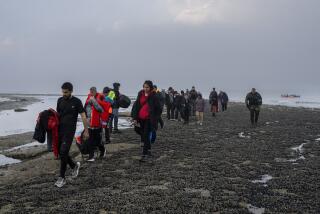Ships’ Crews Set Stowaways Adrift to Avoid Fines
- Share via
Filipino crewmen who deserted the container ship Maersk Dubai in the harbor at Halifax, Nova Scotia, told authorities a chilling tale of cruelty--perhaps murder--on the high seas.
Faced with being set adrift on a makeshift raft, they said, a Romanian stowaway fell to his knees before the ship’s captain, Cheng Shiou, pleading and praying for his life. Relentlessly, Cheng shouted the man off the deck and down the pilot ladder.
When the stowaway clung to the ladder, Cheng pushed him down to the raft, made of two oil drums and some boards lashed together. A second frightened stowaway already was sprawled on the raft, bobbing on the icy waves of the Atlantic.
As the stowaway pleaded, the 34-year-old Cheng, as frantic as the stowaway, yelled:
“No, no, no! You don’t know the problem!”
The “problem” faced by Capt. Cheng haunts merchant shippers and stowaways around the world, refugee and maritime groups say.
Most Western nations impose fines and fees on shipping companies that bring illegal immigrants to port. That can result in ships’ crews losing their jobs.
As a result, despite the availability of insurance to cover stowaway penalties, some owners and crews simply see to it that stowaways don’t make it to port.
Neither of the two Romanian stowaways forced off the Taiwanese-owned Maersk Dubai on March 12 on a voyage from Algeciras, Spain--nor a third allegedly tossed overboard on a second voyage two months later--have been seen again, according to testimony at a Canadian inquest.
The Royal Canadian Mounted Police identified the alleged victims as Gheorghe Florin Mihoc, 18, Petre Singeorzan, 20, and a 29-year-old man named Radu, who may be nicknamed Tunaru.
Cheng and six fellow Taiwanese officers, being held in Canada under $7,300 bond each, face possible extradition to Romania to be tried for first-degree murder. Taiwan is trying to take charge of the case.
The other officers charged are first mate Wu Chung-Chih, 48; second mate Kuo Chin-Shui, 34; chief engineer Ni Yung-Lai; 44; ship’s carpenter You Chaur-Sheeng, 44; cook Wang Ko-Lung, 37; and the radio operator, Jang Che-Min, 42.
Defense lawyers insist that the castaways may have made it safely back to shore and are still alive.
According to the testimony of crew members, Cheng and the stowaways were almost equally anguished by his actions.
“I have a baby!” Cheng tried to explain before pushing the struggling stowaway overboard. “I have a family!”
“Unfair legislation throughout most of the Western world . . . provides shipowners with incentive, provides crew members with incentive, to do away with stowaways,” says Larry Kahn of the Center for Seafarers’ Rights in New York.
When employers retaliate for stowaway fines by docking pay or firing or blacklisting the crew, killing stowaways has proved “the only practical solution for most crew members,” Kahn says.
“They were left a choice between two completely evil choices,” he says.
The Maersk Dubai affair came to the attention of authorities when eight Filipino crewmen jumped ship and told authorities what had happened. Other cases are discovered only because the castaways survive.
Last January, Japanese fishermen rescued two Rwandan refugees who said they had been set adrift off a Singapore freighter on a raft of logs and oil drums.
It’s impossible to know how many stowaways die, or even how many stow away. Certainly, tens of thousands of would-be immigrants sneak aboard ships every year, says Ove Tvedt of the shipping industry’s Denmark-based Baltic and International Maritime Organization.
Tvedt contends that fines play only a negligible role--at most--in any mistreatment of stowaways. Nevertheless, some in the West are changing the way they treat shipping companies and stowaways.
This year the U.N. International Maritime Organization is expected to adopt guidelines recommending that home nations, port authorities and shipping companies all share responsibilities for the humane handling of stowaways.
In the United States, measures in an immigration bill that Congress passed in September limit shipowners’ expenses and duties regarding stowaways.
Many other nations have no plans to ease their penalties for stowaways, however.
In many Western nations, that means shipping companies must not only pay a fine, but provide room, board and guard for stowaways until an asylum ruling is handed down, Kahn says. Ships that bring in stowaways can be held in port until a ruling. On occasion, the costs to shipping companies have mounted to the hundreds of thousands of dollars.
With the cost of mercy running that high, ship crews may not only kill stowaways but refuse to pick up victims of shipwrecks or pirates on the high seas, says Roger Kohn of the London-based U.N. maritime agency. If the rescued people lack proper papers, ports may treat them as any other illegal immigrant.
“The temptation is to sail right past them and let them die,” Kohn says. “It sounds awful, sounds dreadful that people would be so reckless of human life. But the shipowner would say so are port authorities at the end of the voyage.”
Canada’s fees would have meant that the the Maersk Dubai’s owners would have been dunned about $15,300 if all three Romanian stowaways had made it to port in Halifax. None did.
More to Read
Sign up for Essential California
The most important California stories and recommendations in your inbox every morning.
You may occasionally receive promotional content from the Los Angeles Times.










